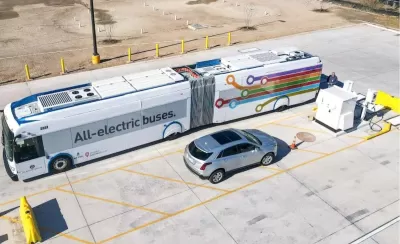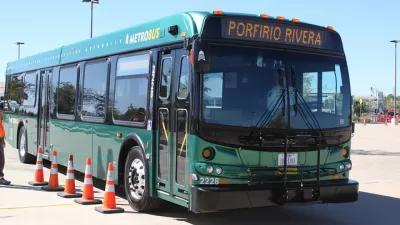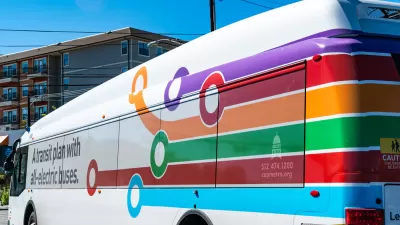Technology problems, short ranges, and supply chain issues hinder Cap Metro’s ambitious electrification plan.

Austin’s Capital Metro is pausing its ambitious plan to shift to an all-electric transit fleet, reports Nathan Bernier for KUT News.
Although voters approved funding for an all-electric transit system through the 202 Project Connect, Cap Metro officials are citing issues with the technology, including a significantly shorter range, as the cause the reversal. “Data obtained by KUT through the Texas Public Information Act revealed CapMetro's battery-electric buses are far less reliable than their diesel counterparts. E-buses had mechanical failures on average every 1,623 miles over the last year — less than half the typical distance between failures for the fleet as a whole.”
The two companies contracted by Cap Metro to deliver the electric buses also faced financial troubles and supply chain issues, with one going out of business. Currently, Cap Metro operates 23 electric buses out of a fleet of 402, with 87 buses on order. “Capital Metro now argues that having a reliable transit service, even with diesel buses, is better for the city and the environment than less reliable public transit with an all-electric fleet.”
FULL STORY: CapMetro stops shift to all-electric bus fleet

Study: Maui’s Plan to Convert Vacation Rentals to Long-Term Housing Could Cause Nearly $1 Billion Economic Loss
The plan would reduce visitor accommodation by 25,% resulting in 1,900 jobs lost.

North Texas Transit Leaders Tout Benefits of TOD for Growing Region
At a summit focused on transit-oriented development, policymakers discussed how North Texas’ expanded light rail system can serve as a tool for economic growth.

Using Old Oil and Gas Wells for Green Energy Storage
Penn State researchers have found that repurposing abandoned oil and gas wells for geothermal-assisted compressed-air energy storage can boost efficiency, reduce environmental risks, and support clean energy and job transitions.

Private Donations Propel Early Restoration of Palisades Playground
Los Angeles has secured over $1.3 million in private funding to restore the Pacific Palisades playground months ahead of schedule, creating a modern, accessible space that supports community healing after recent wildfires.

From Blight to Benefit: Early Results From California’s Equitable Cleanup Program
The Equitable Community Revitalization Grant (ECRG) program is reshaping brownfield redevelopment by prioritizing projects in low-income and environmental justice communities, emphasizing equity, transparency, and community benefits.

Planting Relief: Tackling Las Vegas Heat One Tree at a Time
Nevada Plants, a Las Vegas-based nonprofit, is combating the city’s extreme urban heat by giving away trees to residents in underserved neighborhoods, promoting shade, sustainability, and community health.
Urban Design for Planners 1: Software Tools
This six-course series explores essential urban design concepts using open source software and equips planners with the tools they need to participate fully in the urban design process.
Planning for Universal Design
Learn the tools for implementing Universal Design in planning regulations.
Ascent Environmental
Borough of Carlisle
Institute for Housing and Urban Development Studies (IHS)
City of Grandview
Harvard GSD Executive Education
Toledo-Lucas County Plan Commissions
Salt Lake City
NYU Wagner Graduate School of Public Service




























